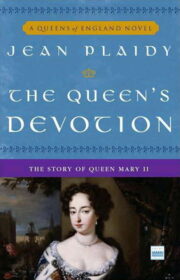It hurt more perhaps because he could be faithful, but not to me. I had been the foolish child whom he must take because of a treaty, the tearful bride who had in the beginning been unable to hide her disgust for him and her dislike of the match. So he turned to Elizabeth Villiers.
They had sold me into marriage. My father had hated it and he had tried to save me, but it had been beyond his power to do so.
Could I blame William altogether? Yes, I did. He had never been kind, never understanding; he had always been brusque, insisting on domination. And I was the Queen, the one the people wanted, the one they loved. “Oh, be joyful.” “Oh, be doleful.”
I sat down to write to him.
I said I was going to die. I told him that I had suffered a great deal through his liaison with one of my women. There was nothing he could do now to atone for his neglect of me, but for the sake of his mortal soul, I wanted him to repent of his adultery and give up Elizabeth Villiers. I should not be here to know whether he respected my last wish, but for the sake of his own salvation, I hoped he would.
I sealed the letter.
Then I sat there, thinking of Elizabeth Villiers — her air of superiority, her contempt for me, her sly squinting eyes, and all I had suffered through her.
I wished I did not hate her as I did. I should be thinking of my own sins rather than those of others.
If I could go back, how should I act? I could not be sure. But one cannot go back in life and say, “There was the turning point.” There is no quick turn in the path along which Fate has chosen one shall go.
Archbishop Tenison came to see me. I could see that he was aware of the deterioration in my health.
“I have been writing a letter to the King,” I said.
He looked surprised, no doubt wondering why I should write when he was here and I could speak to him.
“I am entrusting it to you,” I went on. “I want you to give it to him when I am dead.”
“Your Majesty,” he protested with that false note of disbelief which people used to deny they are aware of something which must be obvious.
I lifted my hand. “You will do this for me, Archbishop?”
“I am at Your Majesty’s command. Will you join me in prayer?” We prayed and I asked forgiveness for my sins.
EARLY THIS MORNING I saw the spots which were beginning to appear on my body. The dreaded smallpox has come to Kensington. I am certain now that death is close.
I lay down my pen. There are certain matters I must put in order, for there is little time left to me now.
Bibliography
Aubrey, William Hickman Smith, National and Domestic History of England
Bathurst, Benjamin, Lt-Col, the Hon., Letters of Two Queens
Bryant, Sir Arthur, King Charles II
Burnet, Bishop, History of His Own Times, with Notes by the Earls of Dartmouth and Hardwick and Speaker Onslow to which are added the Cursory Remarks of Swift
Chancellor, Frank, Sarah Churchill
Clark, Sir George, The Later Stuarts
Corville, Mrs. Arthur, Duchess Sarah
Chapman, Hester W., Mary II, Queen of England
Hopkinson, M.R., Anne of England
Hume, David, The History of England
Macauley, Lord, Edited by Lady Trevelyan, History of England from the Accession of James II
Oman, Carla, Mary of Modena
Renier, G.T., William of Orange
Sandars, Mary F., Princess and Queen of England, Mary II
Stephen, Sir Leslie and Lee, Sir Sidney, The Dictionary of National Biography
Strickland, Agnes, Lives of the Queens of England
Traill, H.D., William III
Trevelyan, G.M., England Under the Stuarts
Trevelyan, G.M., History of England
Wade, John, British History
Van der Zee, Henri and Barbara, William and Mary


"The Queen’s Devotion: The Story of Queen Mary II" отзывы
Отзывы читателей о книге "The Queen’s Devotion: The Story of Queen Mary II". Читайте комментарии и мнения людей о произведении.
Понравилась книга? Поделитесь впечатлениями - оставьте Ваш отзыв и расскажите о книге "The Queen’s Devotion: The Story of Queen Mary II" друзьям в соцсетях.